
Serie A Betting Guide
Quick History

Founded in 1898, the Italian Serie A is one of the oldest leagues in the world and remains as one of its most prestigious. The league’s heyday was in the 1980s and ‘90s when UEFA ranked it the best European national league.
Italian soccer was originally broken into regional divisions but was combined into a single 18-team tier for the 1929 season. Named Serie A, that top tier grew to as many as 21 teams in 1947 before being reduced back to the original 18-team format in 1952. The league expanded up to its current format of 20 teams in 2004.
The Serie A schedule is symmetric. Each team begins their season by playing every other team once in a 19-game first-half called the andata. The teams then repeat the same schedule for a 19-game second-half called the ritorno. The only alteration between the schedules of the two halves is that the location of the matches is flipped to ensure a home-and-home pattern.
The teams that did not qualify for Serie A in 1929 were assigned to Serie B, the second-tier league of the Italian soccer system. Since its birth, Serie B has contained anywhere from 19-24 teams. The talent that has cycled through Serie A throughout the years is astounding. The Ballon d’Or, France’s award for the world’s best soccer player each year, has been won by more players from Serie A than any other league.
Equally as impressive, 42 of the 100 best soccer players in history played in Serie A during their careers which is the most representation of any league on the list. Although not regarded as the world’s top league today, Serie A was ranked the number-one league in the world by UEFA from 1986-88 and 1990-99.
What Do They Play For?
A promotion and relegation system exists between Serie A and B, sending the bottom-three finishers of Serie A down and the top-three finishers of Serie B up for the following season.
This system provides a strong incentive for teams to finish strong and instigates rivalries and competitive matchups that otherwise would not exist. Internazionale (referred to as Inter) holds bragging rights for surviving the greatest number of years before being relegated from Serie A.
The winner of the 38-game round-robin schedule receives the Coppa Campioni d’Italia, a trophy that has been presented to the winner of Serie A since 1961. Juventus won the first championship and has since amounted far more titles than any other Serie A club.
The top-4 finishers in Serie A are guaranteed spots in that year’s UEFA Champions League, the most prestigious continental club soccer tournament in the world. The fifth- and sixth-place finishers earn entries into the UEFA Europa League, a lesser tournament. First held in 1922, Italian clubs also compete in the annual national tournament, the Coppa Italia. 76 teams from Serie A down to Serie D are given matchup advantages in the tournament based upon their place in the standings that season. The winner receives a bid to the Europa League unless they have already qualified for the Champions League.
The winner of the Coppa Italia squares off with the Serie A winner each season in the Supercoppa Italia. Juventus has dominated the Coppa Italia as well, winning the most titles by a good margin.
Best Sites for Serie A Betting
These days, you have so many online bookmaker options that you can afford to be picky with who receives your business. Serie A is a very popular league with a large following worldwide, meaning that finding a book that offers their matches will not be an issue. When choosing a sportsbook, we like to rank them based on their performance in four main aspects: reliability, customer service, options, and bonuses.
The importance of reliability should be obvious. You want your book to be honest and pay out every time, hassle-free. Prompt and competent customer service is vital just in case you happen to run into any issues. You want a book that offers many different types of bets. It is the less popular bets that have a greater chance of being beaten. If you play at a book that offers a limited selection, you will have a tougher time profiting, not to mention the frustration you encounter when you cannot bet the game you wish.
Because there are so many sportsbooks out there for you to choose from, you should not settle for lackluster bonuses. Deposit bonuses, free bets, and other giveaways are the norm these days to attract business. If your book does not offer these, you can do better.
You have so many options at your fingertips and no excuse to be playing at a sub-par book. For your benefit, we have compiled a list of our favorite sportsbooks, based on the above factors. These books are all highly recommended for Serie A betting.
| RANK | BETTING SITE | SIGN UP BONUS | GET STARTED |
|---|---|---|---|
 Betway Betway |
up to €30 Free Bet | VISIT SITE | |
 Spin Sports Spin Sports |
100% up to €200 | VISIT SITE | |
 888sport 888sport |
100% up to €200 | VISIT SITE |
When soccer betting, it is important to realize that most sportsbooks consider a bet to be complete after full-time. Anything that happens in extra-time or penalties does not affect the wager. Double-check the rules of your book to make sure.
Goal Spreads
Point or goal spreads are a common bet offered by oddsmakers for all sports, and soccer is no exception. A spread is a method for bookies to make matches even and receive equal betting action on either side.
The better team may be given a -1.5 spread, for example, meaning they must win the match by at least two goals for you to win your bet. This is a bit harder than having to win by just one, obviously.
The spread comes in handy when you want to bet on a large favorite who is projected to win comfortably. Using the above example, rather than laying huge odds on Juventus on the 1×2, you can bet the spread and get the standard -110 odds, a much better value.
Goal Totals
The over/under goal total is also a very popular bet in Serie A. Betting the total has you determine whether the number of goals scored in the match will be greater or less than a preset figure. Betting the total is great because you do not need to worry about who wins the match. You are just hoping for either a high- or low-scoring game.
Sometimes you will be handicapping a match and will find yourself unable to confidently predict a winner. Say you think Juventus will play a low-scoring, close match against Bologna, but you think it is a toss-up. You notice the total is set at 3 goals, so you decide to bet the under instead of making a pick in which you are not confident.
While totals are not a common recreational bet between friends or in the office, many professional bettors make their living solely off these gems. Log into your sportsbook and look at the maximum bet allowed for totals. You will notice that this limit is much lower than the limit for moneyline or spread bets. Why is this?
If the book feels they stand a greater chance of losing money on a bet, they will lower its limits. Books know that totals can be more easily beaten and will compensate for it.
Props and Futures
Prop bets are very fun alternatives to traditional bets. There are plenty available for Serie A. Prop bets are unrelated to the match outcome and instead have you predict individual performances or team accomplishments.
Some examples are which player will score first, whether there will be a goal in the first ten minutes of the match, if there will be a red card, or how many combined saves the goalkeepers will have. When you have a hunch that a particular player is going to have a great match, prop bets are your friend.
Futures are rewarding because they provide the greatest value of any bet offered by a sportsbook. As the name implies, futures have you predicting things that will happen far in the future.
Common futures bets in Serie A include the season champion, the Coppa Italia winner, or which teams will be relegated to Serie B. Long-term predictions carry much uncertainty, making them hard to predict for both bettors and oddsmakers.
You will find that large underdogs win quite frequently. If you nail a longshot futures bet, you are looking at a huge payday. It is the ultimate risk-reward wager.
Best Players in Serie A
Diego Maradona

The best to ever take the pitch in Italy was an Argentinian midfielder and striker by the name of Diego Maradona. If you know anything about soccer (or even if you do not), you have likely heard of the brilliance of Maradona.
Often considered one of the two or three greatest players ever, “D10S” played for Serie A club Napoli from 1984-91. Upon arrival, Maradona was greeted like a king. Parades were held in his honor, and the city of Napoli set aside their differences and shortcomings to come together and usher in this new era of greatness.
Maradona would not disappoint, leading Napoli to their first-ever Serie A title in the 1986-87 season. Eruptions of frenzied parties broke out across the city, and Maradona’s name forever had a place in the hearts of fans.
During his seven-year stint in Italy, Maradona netted 115 goals, 81 of them in Serie A play. He led his squad to two Serie A titles, one Coppa Italia title, a UEFA Europa Cup title, and a Supercoppa Italiana title. While he did not have the longevity of other Serie A greats, Maradona undoubtedly made the greatest impact of anyone to ever don a Serie A jersey.
Silvio Piola
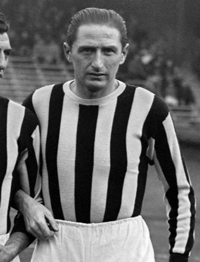
Playing from 1929-1954 with several different teams in Serie A, striker Silvio Piola holds the distinction of being the league’s all-time leading goal-scorer. The finest Italian goal-scorer to ever take the Serie A pitch, Piola was honored posthumously with two of the league’s stadiums changing their names in his honor.
Throughout his career, Piola compiled 274 Serie A goals with plenty more in Serie B and international play with the Italian team. Despite his best efforts, Piola never won a Serie A title.
A three-time runner-up, Piola could never finish on top. He can boast a Serie B title with Novara in 1947-48. Piola was the top goal-scorer in Serie A in two separate seasons.
Roberto Baggio
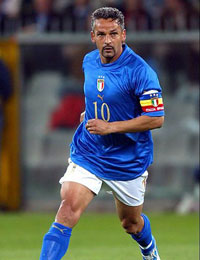
An Italian attacking midfielder known for his finishing abilities and his pristine ponytail, Roberto Baggio was one of the most skilled and entertaining players to ever take the Serie A pitch.
Playing on six different teams from 1985-2004, Baggio seemed to excel everywhere he went. The “Divine Ponytail” used his longevity to net a total of 205 Serie A goals and accumulate a wealth of accolades.
Baggio killed it in the 1990s. He won two Serie A titles, a Coppa Italia title, and a UEFA Europa Cup title in this decade alone. In his best season, 1993, he was awarded the Ballon d’Or as well as French Onze d’Or, the FIFA World Player of the Year, and the World Soccer Player of the Year awards.
His list of accomplishments is too lengthy to do proper justice, but Baggio is regarded as one of the best players of all time. He was named Italy’s player of the 20th century as well as earning a high spot on FIFA’s list of the 100 greatest soccer players ever.
Top Teams in Serie A
As one of the oldest leagues in Europe, Serie A has plenty of storied clubs. Many talk about the “Big 3” when discussing Serie A.
Juventus
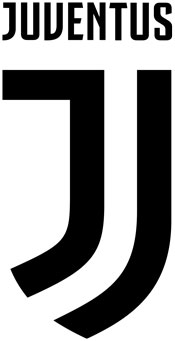
The first of these Big 3 is Juventus. Easily Italy’s most successful club, Juventus holds a giant lead in the races for most Serie A titles and most Coppa Italia titles.
Much like the New York Yankees of Major League Baseball, Juventus is almost always good on a normal year but also enjoys stretches of complete dominance from time to time. Many of Juventus’ titles have been won in four decades: the 1930s, 1970s, 1980s, and 2010s.
Juventus was established in 1897 but was not originally the powerhouse they have become. They won their first Serie A title in 1905 but did not win their second until 1926. It was not until they won five straight titles in the 1930s that they were considered a premier club.
After their 2005-06 Serie A title, Juventus was found to be involved in a league-wide game-rigging scandal, which docked points from their record and resulted in their relegation to Serie B for the next year. In their first-ever season in Serie B, Juventus won the title and returned back to the top level where they have remained since.
Juventus’ run in the 2010s has given them a comfortable cushion in the race for the most Coppa Italia titles, as well. Despite their dominance in Italian play, Juventus has lacked the continental success of Bayern Munich or Barcelona.
The club has two UEFA Champions League titles to its name, with the last being won in the 1995-96 season. Likewise, Juventus’ last Europa League title was also back in the ‘90s.
Milan
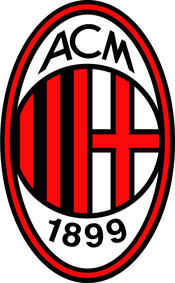
Associazione Calcio Milan (referred to as A.C. Milan or simply Milan) is the second of the Serie A Big 3. Founded in 1899, Milan hit the ground running with three Serie A titles in their first decade.
Milan would then hit a rough patch, not returning back to the throne until the 1950-51 season. This league title was the first of five in an eleven-year stretch, entering Milan into the upper echelon of European clubs.
Milan remained one of the top teams in Serie A for several decades before re-establishing their dominance and winning five league titles in the 1990s. Surprisingly, Milan was unable to win any Coppa Italia titles during either of their dominant stretches, but they managed to win three such titles in the 1970s.
Continentally, Milan excelled in UEFA Champions and Europa League action late in the 20th century but has not done much in this millennium. Milan’s fiercest rival throughout history has been their crosstown foe Inter Milan.
Inter Milan
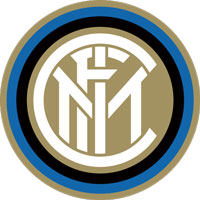
We will now discuss A.C. Milan’s archrival, Internazionale Milano (known simply as Inter). Unlike their Milanese counterpart, much of Inter’s success has been achieved in the 21st century.
The club was very competitive in the 1950s and ‘60s, winning five Serie A titles in a 13-year stretch. Inter then underwent long dry spells and did not regain that dominant form until the 2005-06 season in which they won their first of five straight Serie A titles.
Inter also performed well in clutch tournament matches, taking home both the Coppa Italia title and the Supercoppa Italiana in four of those seasons.
The 2009-10 season was a historic one for Inter as they completed a rare treble. The club won the Serie A title, the Coppa Italia title, and the UEFA Champions League. Inter even added a FIFA Club World Cup title for good measure. The treble was an unprecedented feat for Italian clubs.
Betting Strategy for Serie A
The 2017-18 Serie A season was the first in decades in which each club had at least two home losses. Why is this important? The league’s top teams typically go undefeated or lose just one match per season at home.
Since we know that the chalk performs very well in this league, we can confidently give the favorite an edge when handicapping matches. When favorites have very high win rates, bettors will often parlay several matches together for a big payday.
A parlay keeps bettors from having to lay huge odds on the favorite while adding the thrill of multiple matches and huge winnings.
An optimal betting strategy for Serie A is to observe the standings after about one-third of the season has passed. This gives you an idea of who the elite clubs are. Begin betting on large home favorites at this point, as history indicates they have an overwhelming chance of winning.
Why Bet Serie A?
Serie A is fun to watch and follow while also being extremely advantageous for sharp bettors to wager. Due to home favorites performing so well, bettors who use this criterion as their foundational handicapping tool should find themselves profitable come season’s end.
This league is full of history, tradition, and passion. Few other leagues offer the excitement and opportunities that Serie A can offer. What are you waiting for? Start playing today!